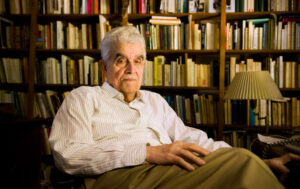Not for nothing has René Girard been described as ‘the Darwin of the Social Sciences’. His key ideas have proved influential in academic disciplines as varied as Literary Criticism, Anthropology, Theology, Philosophy, History, Economics, Politics, Psychology, Psychiatry, Psychotherapy and the study of International Relations.
Does that make him a ‘liberal’ or a ‘conservative’ in Catholic church controversies? Far more important, it makes his work a potential bridge between those two poles. Facing secular relativism squarely in defence of the Creeds, he nevertheless defies any comfortable acquiescence in Christendom, the long alliance between church and state that was undermined by the Enlightenment. Monopolising as it does the use of force, the state can itself easily become enmeshed in mimetic conflict – most dangerously evident in the ongoing nuclear arms race.
Seeing in Girard’s insights an especially potent ‘explainer’ of major current world problems, Sean O’Conaill and Aidan Hart of ACI have written a series of articles for this website. They remain convinced that the church at all levels needs to wake up to Girardian mimetic theory as a fertile source of Catholic intellectual recovery. This page will point to these articles as they continue to appear, and to the work of other writers ‘sparked’ by Girard.
The Violence of Good Friday has nothing to do with God! – Michael Kirwan SJ (Zoomcast)
How the Divine Reproaches of Good Friday make clear that God the Father is in solidarity with all innocent victims, and not the author of the human violence that too often accompanies superficial religion.
The Importance of René Girard : I – Mimetic Desire
Sean O’Conaill’s early consumerist fantasy – explained by the work of René Girard, profound Catholic theoretician on the origins of culture and the genesis of violence.
The Importance of René Girard: II – Jesus and Violence
We must not believe that Jesus intended violence – but that he has obliged us to choose forgiveness and repentance to achieve peace.
Why do we so often begin to want what seems to give happiness and status to others – even at Christmas time? Sean O’Conaill here attempts an explanation of ‘mimetic desire’ by recounting personal experience and by drawing on the insights of Alain deBotton and Charles Dickens.
By applying René Girard’s theory of mimetic desire to the American Dream and national economies, Aidan Hart shows how it reveals their deep sickness and inevitable journey towards increasing violence, environmental decay and the disintegration of the social, moral and religious fabric of society. As our world lurches from crisis to crisis, has Christianity the answer?
As new media-driven cultural forces erode the faith-forming effectiveness of traditional models of Catholic Education, Sean O’Conaill and Eugene McElhinney (former colleagues in the same Irish Catholic second-level school) are optimistic about the long term prospect of a turn-around – based on Girard’s key insights into the driving force behind all culture.
New Light on the Problem of Atonement
René Girard’s insights into the origins of violence and over-consumption help to explain how the Crucifixion reconciles us humans to God.
In what sense is the Mass a ‘Holy Sacrifice’? Does God want violence? Can we instead understand ‘sacrifice’ as redefined by the Cross? Introduction to an important recent article by Anthony R. Lusvardi S.J.
The Colloquium on Violence and Religion
This link will take you to the website of the most important academic community devoted to Girard’s work. It will give a vivid impression of the scale and scope of his ongoing influence – and you can join if you wish!
~*~
Further reading:
Sean O’Conaill became hooked first on Girard’s insights when he read Gil Bailie’s Violence Unveiled (NY, Crossroad) 1995. However, he now believes the best account of Girard’s theory and how it relates to the western philosophical tradition is René Girard’s Mimetic Theory by Wolfgang Palaver (Michigan State University Press) 2013. It’s expensive for a paperback, unfortunately, so a good compromise might be Discovering Girard by Michael Kirwan (Darton, Longman and Todd) 2004 – at less than half the price of Palaver’s book.
In 2018 Cynthia Haven’s intellectual biography of Girard appeared: Evolution of Desire: A Life of René Girard. It was named by the San Francisco Chronicle as one of the top books of 2018
These websites are also dedicated to the ideas of Girard and his collaborators:
The Colloquium on Violence and Religion
The Raven Foundation
The Girardian Lectionary
There’s also a short Wikipedia article on Girard here, useful as an introductory guide to Girard’s academic critics.

